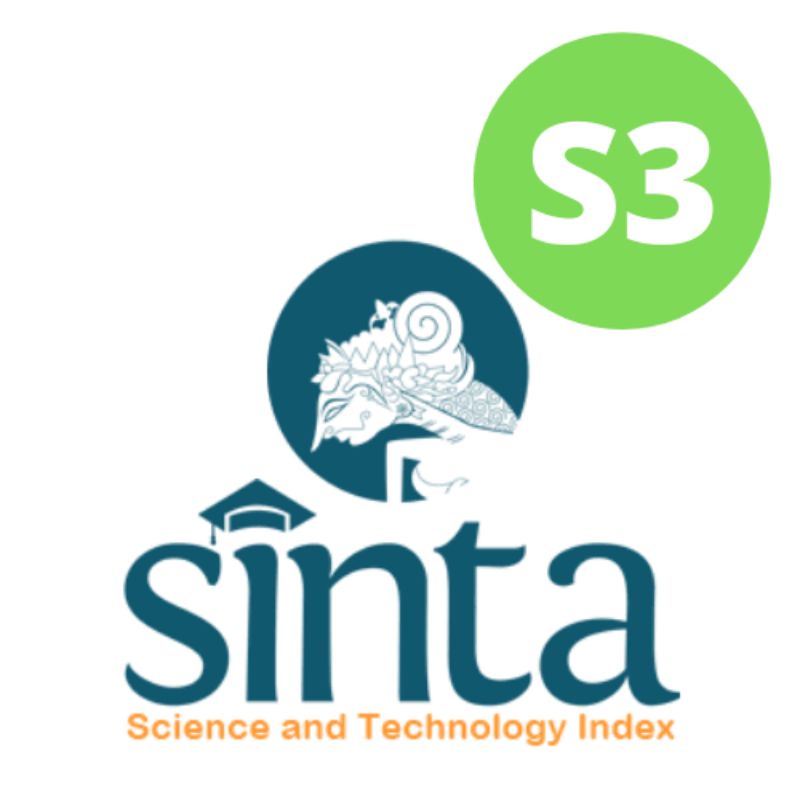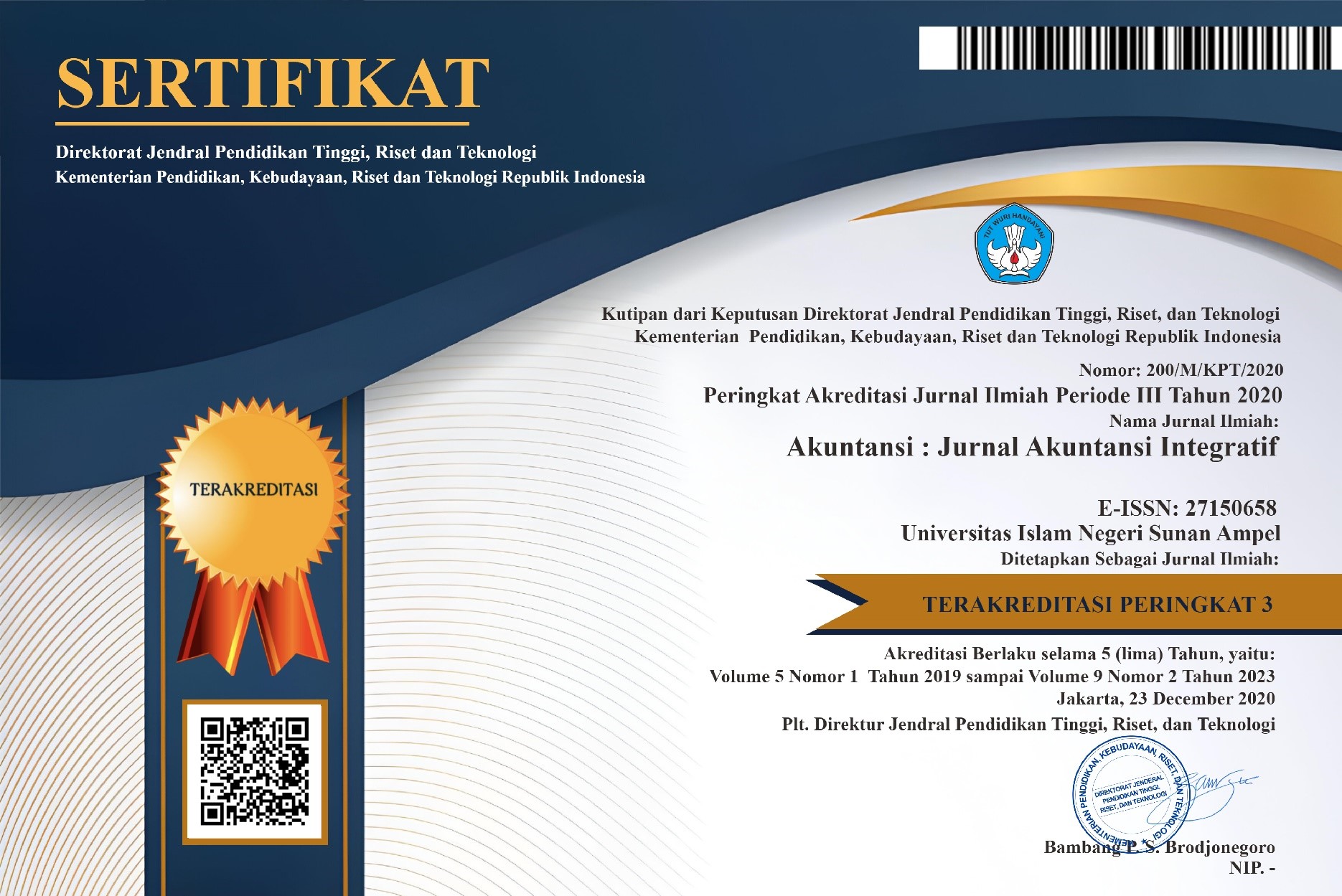Pelaporan Environment Social Governance (ESG) dari Sudut Pandang Filsafat Jawa Berdimensi "Hamemayu Hayuning Bawana"
DOI:
https://doi.org/10.29080/jai.v9i1.1177Keywords:
Environment Social Governance (ESG), Javanese Philosophy, Hamemayu Hayuning Bawana.Abstract
Environmental, social and governance issues drive corporate strategy and performance to follow suit in the form of Environment Social Governance (ESG) reporting. ESG for investors is an important strategy that must be considered when making investment decisions because of course they will make the decision to invest in companies that can generate high profits. This Javanese teaching which teaches harmony and harmony between humans, nature and God is known as the philosophy "Hamemayu Hayuning Bawana". This study aims to analyze the dimensions of ESG from the perspective of the Javanese philosophical concept "Hamemayu Hayuning Bawana". The research method used is a qualitative method. The data analysis technique used was systemic literature review (SLR). The results of this study indicate that there is compatibility between the dimensions of ESG and the Javanese philosophy concept of Hamemayu Hayuning Bawana.
Downloads
References
Abdi, Y., Li, X., & Càmara-Turull, X. (2022). Exploring the impact of sustainability (ESG) disclosure on firm value and financial performance (FP) in airline industry: the moderating role of size and age. Environment, Development and Sustainability, 24(4), 5052–5079. https://doi.org/10.1007/s10668-021-01649-w
Ainia, D. K. (2021). Konsep Metafisika Dalam Falsafah Jawa Hamemayu Hayuning Bawana. Jurnal Filsafat Indonesia, 4(2), 195. https://doi.org/10.23887/jfi.v4i2.30591
Aksoy, L., Buoye, A. J., Fors, M., Keiningham, T. L., & Rosengren, S. (2022). Environmental, Social and Governance (ESG) metrics do not serve services customers: a missing link between sustainability metrics and customer perceptions of social innovation. Journal of Service Management, 33(4–5), 565–577. https://doi.org/10.1108/JOSM-11-2021-0428
Annisa, A. N., & Hartanti, D. (2021). The Impact of Environmental, Social, and Governance Performance on Firm Risk in the ASEAN-5 Countries, 2011-2017. Proceedings of the Asia-Pacific Research in Social Sciences and Humanities Universitas Indonesia Conference (APRISH 2019), 558, 625–634. https://doi.org/10.2991/assehr.k.210531.078
Apriasari, H. (2021). Konsep Harmoni Antara Manusia, Alam, Dan Tuhan Sebagai Sebuah Kearifan Lokal Dalam Menghadapi Bencana Bagi Masyarakat Jawa the Concept of Harmony Between Human, Nature, and God As Local Wisdom in Facing Disaster for the Javanese Society. Jurnal Manajemen Bencana (JMB), 7(2), 133–140. https://doi.org/10.33172/jmb.v7i2.770
Arvidsson, S., & Dumay, J. (2022). Corporate ESG reporting quantity, quality and performance: Where to now for environmental policy and practice? Business Strategy and the Environment, 31(3), 1091–1110. https://doi.org/10.1002/bse.2937
Broadstock, D. C., Chan, K., Cheng, L. T. W., & Wang, X. (2021). The role of ESG performance during times of financial crisis: Evidence from COVID-19 in China. Finance Research Letters, 38(July 2020), 101716. https://doi.org/10.1016/j.frl.2020.101716
Cakranegara, P. A. (2021). Investasi hijau: mengintergrasikan faktor enviromental, social dan governance dalam keputusan investasi. Jurnal Akuntansi, Keuangan, Dan Manajemen, 2(2), 103–114. https://doi.org/10.35912/jakman.v2i2.112
Ciptoprawiro, Abdullah. (1986). Filsafat Jawa. Jakarta: Balai Pustaka.
Clementino, E., & Perkins, R. (2021). How Do Companies Respond to Environmental, Social and Governance (ESG) ratings? Evidence from Italy. Journal of Business Ethics, 171(2), 379–397. https://doi.org/10.1007/s10551-020-04441-4
Darnall, N., Ji, H., Iwata, K., & Arimura, T. H. (2022). Do ESG reporting guidelines and verifications enhance firms’ information disclosure? Corporate Social Responsibility and Environmental Management. https://doi.org/10.1002/csr.2265
De Silva, C. S., Lokuwaduge, S., Keshara, &, & de Silva, M. (2022). ESG Risk Disclosure and the Risk of Green Washing.
Drempetic, S., Klein, C., & Zwergel, B. (2020). The Influence of Firm Size on the ESG Score: Corporate Sustainability Ratings Under Review. Journal of Business Ethics, 167(2), 333–360. https://doi.org/10.1007/s10551-019-04164-1
Engelmann, K. (1954). In Search of an Accounting Philosophy. Accounting Review, 29(3), 383.
Hahn, R., & Kühnen, M. (2013). Determinants of sustainability reporting: A review of results, trends, theory, and opportunities in an expanding field of research. In Journal of Cleaner Production (Vol. 59, pp. 5–21). https://doi.org/10.1016/j.jclepro.2013.07.005
Husada, E. V., & Handayani, S. (2021). Pengaruh Pengungkapan ESG Terhadap Kinerja Keuangan Perusahaan (Studi Empiris Pada Perusahaan Sektor Keuangan Yang Terdaftar Di Bei Periode 2017-2019). Jurnal Bina Akuntansi, 8(2), 122–144. https://doi.org/10.52859/jba.v8i2.173
Ikhwanto, B. (2019). Makna Hakiki “Aja Dumeh.” Kawruh : Journal of Language Education, Literature and Local Culture, 1(1), 96–104. https://doi.org/10.32585/kawruh.v1i1.242
Jaya, I. M. L. M., Sawarjuwono, T., Sungkono, S.-, & Ilahiyah, M. E. (2021). Ethics, Behaviors, and Characters of Memayu Hayuning Bawono, Ambrasto Dur Hangkoro Accountant in Java. Jurnal Kajian Akuntansi, 5(2), 142. https://doi.org/10.33603/jka.v5i2.5110
Kamayanti, A., & Ahmar, N. (2019). Tracing Accounting in Javanese Tradition. International Journal of Religious and Cultural Studies, 1, 15–24. https://doi.org/10.34199/ijracs.2019.4.003
Kamela, H., & Alam, R. S. (2021). The Influence of Voluntary Global Reporting Initiative (GRI) On The Performance Of Indonesia Listed Companies. Jurnal Akuntansi, 11(1), 16–22. https://doi.org/10.33369/j.akuntansi.11.1.16-22
Kim, S., & Li, Z. (2021). Understanding the impact of ESG practices in corporate finance. Sustainability (Switzerland), 13(7), 1–15. https://doi.org/10.3390/su13073746
Kusdarini, E., Sunarso, & Widihastuti, S. (2016). Pengembangan Asas-Asas Umum Pemerintahan Yang Baik Melalui Local Wisdom Keraton Yogyakarta. Jurnal Penelitian Humaniora, 21(1), 22–32.
Lamberton, G. (2015). Accounting and happiness. Critical Perspectives on Accounting, 29, 16–30. https://doi.org/10.1016/j.cpa.2014.10.005
Li, T. T., Wang, K., Sueyoshi, T., & Wang, D. D. (2021a). ESG: Research progress and future prospects. Sustainability (Switzerland), 13(21). https://doi.org/10.3390/su132111663
Li, T. T., Wang, K., Sueyoshi, T., & Wang, D. D. (2021b). Esg: Research progress and future prospects. In Sustainability (Switzerland) (Vol. 13, Issue 21). MDPI. https://doi.org/10.3390/su132111663
Liu, P., Zhu, B., Yang, M., & Chu, X. (2022). ESG and financial performance: A qualitative comparative analysis in China’s new energy companies. Journal of Cleaner Production, 379(P1), 134721. https://doi.org/10.1016/j.jclepro.2022.134721
Lubis, M. F. F., & Rokhim, R. (2021). The Effect of Environmental, Social, and Governance (ESG) Disclosure and Competitive Advantage on Companies Performance as An Implementation of Sustainable Economic Growth in Indonesia for Period of 2015-2019. IOP Conference Series: Earth and Environmental Science, 940(1), 1–6. https://doi.org/10.1088/1755-1315/940/1/012059
Nurkholida, E. (2018). Filsafat Pendidikan Menurut Perspektif Jawa (Studi Pemikiran Ki Hajar Dewantara). Cendekia: Jurnal Kependidikan Dan Kemasyarakatan, 16(2), 393. https://doi.org/10.21154/cendekia.v16i2.1374
Öcal, H., & Kamil, A. A. (2021). The impact of risk indicators on sustainability (ESG) and broad-based indices: An empirical analysis from Germany, France, Indonesia and Turkey. International Journal of Sustainable Economy, 13(1), 18–54. https://doi.org/10.1504/IJSE.2021.113319
Pangesti, R. D. (2017). Corporate Social Responsibilitu dalam Pemikiran Budaya Jawa Berdimensi “Hamemayu Hayuning Bawana” (Pendekatan Studi Hermeneutika). Jurnal Riset Akuntansi Dan Bisnis Airlangga, 2(2), 224–238. https://doi.org/10.31093/jraba.v2i2.42
Pedersen, L. H., Fitzgibbons, S., & Pomorski, L. (2021). Responsible investing: The ESG-efficient frontier. Journal of Financial Economics, 142(2), 572–597. https://doi.org/10.1016/j.jfineco.2020.11.001
Peng, W., & Xiong, L. (2022). Managing financing costs and fostering green transition: The role of green financial policy in China. Economic Analysis and Policy, 76(25), 820–836. https://doi.org/10.1016/j.eap.2022.09.014
Prasetyo, B. (2018). Alam Dan Manusia “Sebuah Kesatuan Yang Dipisahkan Wacana.” WASKITA: Jurnal Pendidikan Nilai Dan Pembangunan Karakter, 2(1), 31–46. https://doi.org/10.21776/ub.waskita.2018.002.01.3
Priyudahari, B. A. P., & Prasojo, L. D. (2020). Hamemayu Hayuning Bawana Based Education Management. Advances in Social Science, Education and Humanities Research, 511(Yicemap 2019), 57–59. https://doi.org/10.2991/assehr.k.201221.013
Reber, B., Gold, A., & Gold, S. (2022). ESG Disclosure and Idiosyncratic Risk in Initial Public Offerings. Journal of Business Ethics, 179(3), 867–886. https://doi.org/10.1007/s10551-021-04847-8
Riyanto, FX. E. A. (2022). “HAMEMAYU HAYUNING BAWONO” (“To beautify the beauty of the world”). Proceedings of the International Symposium on Religious Literature and Heritage (ISLAGE 2021), 644(Islage 2021), 353–362. https://doi.org/10.2991/assehr.k.220206.047
Roestanto, A., Vivianita, A., & Nurkomalasari, N. (2022). Pengaruh Ukuran Perusahaan, Umur Perusahaan, Jenis Industri, Dan Struktur Kepemilikan Terhadap Environmental, Social, And Governance (ESG) Disclosure (Studi Empiris Perusahaan Di Indonesia Yang Terdaftar di IDX 2017-2020). Jurnal Akuntansi STIE Muhammadiyah Palopo, 08(1), 1–18.
Saktimulya, S.R. (2015). Javanese Scripts and Manuscripts. Museum Nasional Indonesia.
Shakil, M. H. (2021). Environmental, social and governance performance and financial risk: Moderating role of ESG controversies and board gender diversity. Resources Policy, 72. https://doi.org/10.1016/j.resourpol.2021.102144
Shakil, M. H. (2022). Environmental, social and governance performance and stock price volatility: A moderating role of firm size. Journal of Public Affairs, 22(3). https://doi.org/10.1002/pa.2574
Sulistiyani, A. T., Sutarno, Setyono, P., & Wahyunengseh, R. D. (2021). The local elites perception of “hamemayu Hayuning Bawana” philosophies in the Green Village Program in Yogyakarta Province. IOP Conference Series: Earth and Environmental Science, 724(1). https://doi.org/10.1088/1755-1315/724/1/012099
Sumunar, K., & Djakman, C. (2020). Ceo Overconfidence, ESG Disclosure, and Firm Risk. Jurnal Akuntansi Dan Keuangan Indonesia, 17(1). https://doi.org/10.21002/jaki.2020.01
Tamara, D., & Budiman, F. (2022). New Index ESG Leaders & Investment Decisions in Indonesia Relating to ESG Principles. Journal of Management and Sustainability, 12(1), 64. https://doi.org/10.5539/jms.v12n1p64
Torre, M. La, Mango, F., Cafaro, A., & Leo, S. (2020). Does the ESG index affect stock return? Evidence from the Eurostoxx50. Sustainability (Switzerland), 12(16). https://doi.org/10.3390/SU12166387
Triyani, A., Setyahuni, S. W., & Kiryanto, K. (2020). The Effect Of Environmental, Social and Governance (ESG) Disclosure on Firm Performance: The Role of Ceo Tenure. Jurnal Reviu Akuntansi Dan Keuangan, 10(2), 261. https://doi.org/10.22219/jrak.v10i2.11820
Wagiran. (2013). Pengembangan Karakter Berbasis Kearifan Lokal Hamemayu Hayuning Bawana (Identifikasi Nilai-nilai Karakter Berbasis Budaya). Jurnal Pendidikan Karakter, 3(3). https://doi.org/10.21831/jpk.v0i3.1249
Wibawa, S. (2013). Nilai Filosofi Jawa Dalam Serat Centhini. LITERA, 12(2), 328–344.
Yawika, M. K., & Handayani, S. (2019). The Effect of ESG Performance on Economic Performance in the High Profile Industry in Indonesia. Journal of International Business and Economics, 7(2), 112–121. https://doi.org/10.15640/jibe.v7n2a12
Downloads
Published
How to Cite
Issue
Section
License
Copyright (c) 2023 Yanuar Nugroho, Nanik Ermawati, Novrys Suhardianto

This work is licensed under a Creative Commons Attribution-ShareAlike 4.0 International License.









